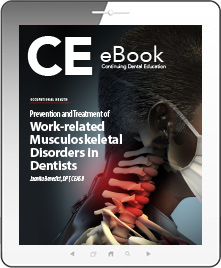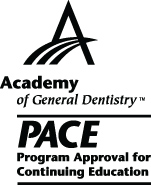CDEWorld > eBooks > Prevention and Treatment of Work-related Musculoskeletal Disorders in Dentists


ADA CERP is a service of the American Dental Association to assist dental professionals in identifying quality providers of continuing dental education. ADA CERP does not approve or endorse individual courses or instructors, nor does it imply acceptance of credit house by boards of dentistry. Concerns or complaints about a CE provider may be directed to the provider or to ADA CERP at www.ada.org/cerp/

Approved PACE Program Provider. FAGD/MAGD credit. Approval does not imply acceptance by a state or provincial board of dentistry, or AGD endorsement. 1/1/2023 to 12/31/2028. ID # 209722.
eBook
Released: Tuesday, September 26, 2017
Expires: Wednesday, September 30, 2020
Prevention and Treatment of Work-related Musculoskeletal Disorders in Dentists
By Juanita Benedict, DPT, CEAS II
Commercial Supporter: Orascoptic
Work-related musculoskeletal disorders (WMSDs) have become a global problem in dentistry. General and specific exercise programs can help prevent and protect dentists from the development of WMSDs. However, WMSDs are complex, so no single intervention can fix everything. A multifactorial approach to WMSD prevention includes identification of sources of pain, exercise programs, proprioceptive awareness training and ergonomic solutions.
LEARNING OBJECTIVES:
-
Discuss the impact of work-related musculoskeletal disorders (WMSDs) on dentists' health, lifestyle, and financial status.
-
Explain how WMSDs develop and how they can be prevented or treated.
-
Describe specific exercises and other activities that can help prevent or alleviate pain associated with WMSDs.
-
Describe work-related and everyday tasks that can cause or worsen WMSDs.
About the Author
Juanita Benedict is a Dental Ergonomic Consultant in Orlando, Florida.
Download FREE eBook now!

